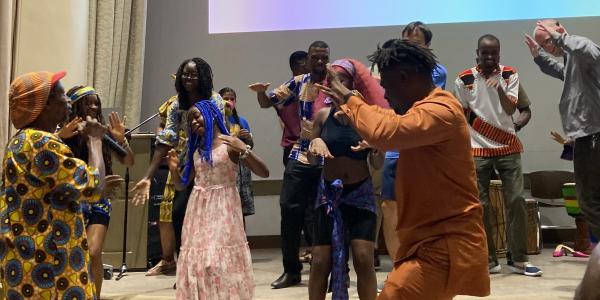
September 16 and 17, 2022, saw Posvar Hall abuzz with energy. Starting at 10 am on Friday, students, faculty, staff, and members of Pittsburgh’s African diaspora community filled the Global Hub and several classrooms in a celebration of African knowledge, scholarship, and heritage. Guests reached out and shook hands across cultures, then sat down to learn from speakers, roundtable participants, and each other.
Sessions covered everything from women’s empowerment to African social initiatives to learning African languages. Lectures and roundtables evolved organically into deeper discussion with participants from countries and diaspora communities around the African continent and world. By the time attendees had finished a day-long journey through their sessions of choice, many were able to share new knowledge about Africa, introduce a friend they sat next to, or say hujambo, ahlan, or selam (hello in Swahili, Arabic, and Amharic, respectively).
The first day’s events culminated with a reception, for which an entourage of conference attendees paraded across the street to the Frick Fine Arts building. As guests mingled over hors d’oeuvres, the Camara Drum and Dance ensemble parked their instruments on the patio outside and got the crowd dancing and clapping ahead of a keynote by renowned Pan-African scholar Dr. Paul Zeleza.
Dr. Zeleza’s keynote, titled “Africa’s Trajectory in the 21st Century: From a Historic Pawn into a Player”, was kicked off by a warm welcome from Chancellor Ariel Armony, Provost Ann Cudd, and county executive Rich Fitzgerald. Zeleza’s remarks illuminated a golden thread that had run through the whole day of activities and discourse—that Africa will be a key player in our global future, its trajectory inextricably tied to that of the world at large.
Towards the end of his address, Zeleza wrapped up a key theme of the day rather concisely, stating, “Africa’s demographic, diaspora, and cultural resurgence, together with equally complex and contradictory transformations in various political, economic, social, and ecological spheres...have far reaching implications for the world. Africa has never been a peripheral region, and certainly what happens on the continent will shape the rest of the world in this century and subsequent ones.”
On Saturday, many familiar faces from the day before returned to connect with each other and spend an entire day in celebration. The aromas of Nigerian jollof and music of the African diaspora wafted over Posvar patio, welcoming Pittsburghers of all ages to join the party. Children excitedly participated in the call-and-response of stories told by Dr. Nosakhere Griffin-El and Dr. Leonora Kivuva. Attendees were also welcomed to tour the Africa room in the Cathedral of Learning.
Dr. Catherine Koverola, director of the Center for African Studies, said, “This event was a wonderful way to show the Pitt community so much of what Africa has to offer: culture, a deep well of knowledge and scholarship, and an exciting vision of the future. We look forward to keeping the conversation and celebration of the past two days going all year long.”
Center for African Studies staff are already planning to host a second Celebrate Africa event next year. If you’re interested in being part of their work, taking an African language or culture course, or attending future events, please contact africast@pitt.edu.

